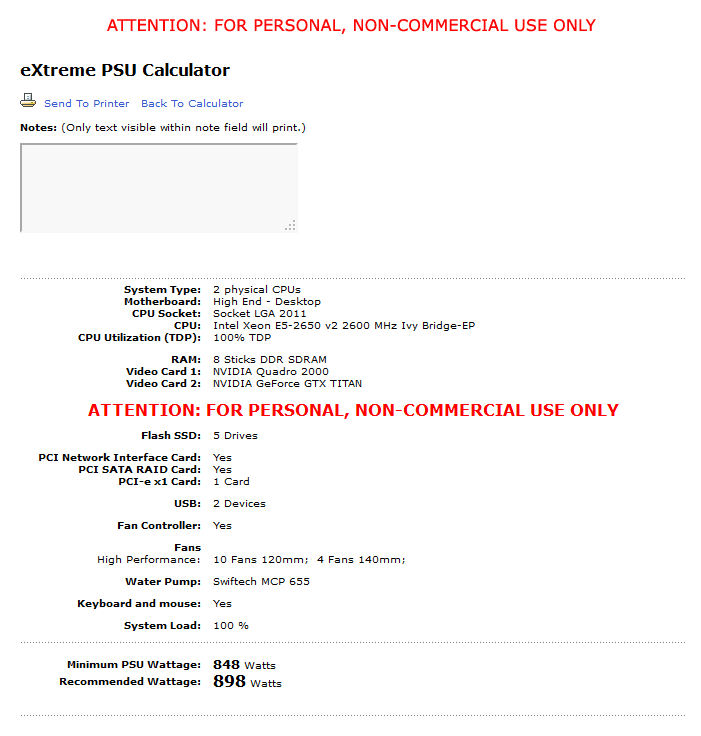This is a heavy load workstation with specific types of computations/analysis.
So I've done most of my research and I've come this far:
YOUR BASKET
2 x Intel Xeon E5-2650v2 2.60GHz 8-Core with Hyperthreading & Turbo (Socket 2011) - Retail £899.99 (£1,799.98)
1 x EVGA GeForce TITAN Black Edition 6144MB GDDR5 PCI-Express Graphics Card (3790-KR) £799.99
1 x Kingston HyperX Beast 64GB (8x8GB) PC3-17100C11 2133MHz Dual Channel Kit (KHX21C11T3FK8/64X) £479.99
4 x Samsung 1TB SSD 840 EVO SATA 6Gb/s Basic - (MZ-7TE1T0BW) £449.99 (£1,799.96)
1 x Asus Z9PE-D8 WS Dual Socket C602 Chipset (Socket 2011) DDR3 Motherboard £419.99
1 x PNY Nvidia Quadro 2000 Graphics Card - 1GB - GDDR5 SDRAM £419.99
1 x Enermax Platimax 1350w '80 Plus Platinum' Modular Power Supply (EPM1350EWT) £399.95
1 x Corsair Obsidian 900D Super Tower Case (CC-9011022-WW) £299.99
1 x LSI 3Ware SAS 9750-4i SGL Controller Card - (OEM) RAID £274.99
1 x Samsung 256GB SSD 840 PRO SATA 6Gb/s Basic - (MZ-7PD256BW) £179.99
Total : £6,895.02 (includes shipping : £16.85).










Just some points:
Any thoughts or comments? This is my first pro workstation build.
So I've done most of my research and I've come this far:
YOUR BASKET
2 x Intel Xeon E5-2650v2 2.60GHz 8-Core with Hyperthreading & Turbo (Socket 2011) - Retail £899.99 (£1,799.98)
1 x EVGA GeForce TITAN Black Edition 6144MB GDDR5 PCI-Express Graphics Card (3790-KR) £799.99
1 x Kingston HyperX Beast 64GB (8x8GB) PC3-17100C11 2133MHz Dual Channel Kit (KHX21C11T3FK8/64X) £479.99
4 x Samsung 1TB SSD 840 EVO SATA 6Gb/s Basic - (MZ-7TE1T0BW) £449.99 (£1,799.96)
1 x Asus Z9PE-D8 WS Dual Socket C602 Chipset (Socket 2011) DDR3 Motherboard £419.99
1 x PNY Nvidia Quadro 2000 Graphics Card - 1GB - GDDR5 SDRAM £419.99
1 x Enermax Platimax 1350w '80 Plus Platinum' Modular Power Supply (EPM1350EWT) £399.95
1 x Corsair Obsidian 900D Super Tower Case (CC-9011022-WW) £299.99
1 x LSI 3Ware SAS 9750-4i SGL Controller Card - (OEM) RAID £274.99
1 x Samsung 256GB SSD 840 PRO SATA 6Gb/s Basic - (MZ-7PD256BW) £179.99
Total : £6,895.02 (includes shipping : £16.85).










Just some points:
- I already have the Quadro, just added it because I'll be installing it.
- I run four Samsung 840 Evos in RAID 0 on the LSI for workspace. Samsung 840 Pro for OS.
- I have a 10 Gbps ethernet PCI-E card.
- I haven't chosen watercooling parts yet.
Any thoughts or comments? This is my first pro workstation build.





















